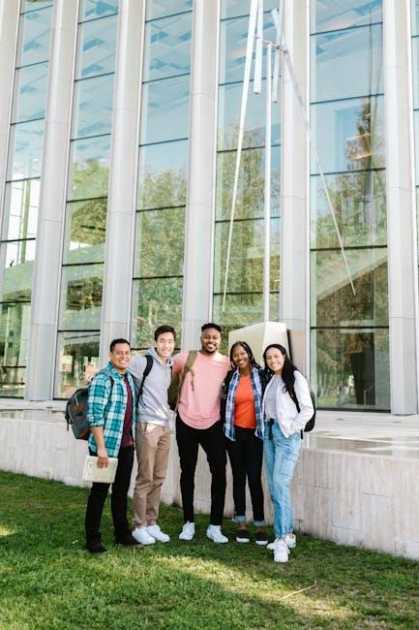Picture this: the aroma of freshly baked baguettes wafting through charming cobblestone streets, the eiffel Tower silhouetted against a blazing sunset, adn vibrant discussions echoing in quaint cafés as students from across the globe gather to exchange ideas. Studying in France is not just an academic pursuit; it’s an adventure that immerses you in a rich tapestry of culture, history, and innovation. As you set your sights on one of the world’s most prestigious educational landscapes, the journey begins with navigating the essential aspects of moving to this enchanting country. In this guide,we’ll explore the intricacies of the visa process,uncover exciting scholarship opportunities,and unveil top universities that can definitely help you carve your path in the academic and professional realms. Whether you’re drawn by the allure of Parisian art or the avant-garde spirit of Lyon, this article is your key to unlocking the doors to a transformative educational experience in France in 2025.
Navigating the Visa Maze for Studying in France
Navigating the visa process can often feel like wandering through a labyrinth, but with the right approach, you can find your way to studying in France. start by determining the type of visa you need, which typically depends on the length of your study program. The most common visa for international students is the “Student Visa” (VLS-TS). Some important documents you will need to prepare include:
- Valid passport with at least two blank pages
- Acceptance letter from a recognized French institution
- Proof of financial means to support yourself during your studies
- Proof of accommodation in France
- Health insurance covering your stay in France
Once you have gathered all necessary documents, you can apply for your visa through the French consulate or embassy in your home country. Be mindful of the submission timelines as processing can take several weeks. You may also be required to pay a visa fee, which can vary from country to country. To help streamline your application, consider using a checklist to ensure you haven’t missed anything. Below is a simple table summarizing important visa-related fees:
| visa Type | Estimated Fee (Euros) |
|---|---|
| Long Stay Student Visa | 99 |
| Short Stay Visa | 60 |
| Renewal of Student Visa | 50 |
Unlocking Financial Opportunities: Scholarships for International Students
Studying in France is an exciting possibility, especially for international students seeking to immerse themselves in a rich cultural and academic habitat.However, financing your education can pose a meaningful challenge. Thankfully, a variety of scholarships are available, specifically aimed at supporting students from abroad.These scholarships not only alleviate the financial burden but also enhance your academic experience by connecting you with local universities and international networks.Some of the most notable scholarships include:
- Émile Boutmy Scholarship: Offered by Sciences Po, it is tailored for non-European students demonstrating financial need.
- French Government Scholarships: Provided to international students by the Ministry of Europe and foreign Affairs, covering tuition and living expenses.
- Eiffel excellence Scholarship Program: Designed for master’s and PhD students, this prestigious scholarship aims to attract top talent from around the world.
- Université Paris-Saclay International Master’s Scholarships: Available for students enrolled in master’s programs within partner universities of Paris-saclay.
In addition to these programs, many universities have their own dedicated scholarships to encourage diversity within their student body. Frequently enough, these awards are based on merit, financial need, or specific academic disciplines.To make the application process more accessible, consider reaching out directly to the financial aid office of the universities you are interested in. They can provide tailored guidance on the scholarships you may qualify for. For your reference, here’s a comparison of a few prominent scholarships:
| Scholarship Name | Eligibility | Value |
|---|---|---|
| Émile Boutmy | non-European students | Up to €13,000/year |
| Eiffel Excellence | Master’s & PhD students | Up to €1,181/month |
| Paris-Saclay | Master’s students | Up to €10,000/year |
Top French Universities: A Guide to Academic Excellence
France boasts a rich educational heritage, making it home to several esteemed institutions that consistently rank among the top universities globally. Notable names include Université PSL, known for its interdisciplinary approaches and vibrant research community. École Normale Supérieure (ENS) is another flagship institution, renowned for its rigorous academic programs and notable alumni, including several Nobel laureates. Additional institutions that excel in various fields include:
- Université Paris-Saclay: A leader in science and technology.
- HEC Paris: A premier business school recognized for its innovative curriculum.
- Sciences Po: Distinguished for political science and international relations.
The French educational framework emphasizes not only academic knowledge but also critical thinking and creativity. Studying in these universities requires adaptability and a proactive approach, as students engage in collaborative projects, workshops, and seminars that nurture global competence.Students can explore specialized programs in english, increasing accessibility for international candidates.The table below highlights some of the key academic disciplines offered by these institutions and their unique features:
| University | Specialization | Unique Feature |
|---|---|---|
| Université PSL | Interdisciplinary Studies | Collaborative research environment |
| École Normale Supérieure | Humanities and Sciences | Prestigious alumni network |
| HEC Paris | Business Management | Strong industry connections |
Cultural Integration: Tips for Thriving in Your New Environment
Embracing a new culture can be both exciting and daunting. To make your transition smoother, it’s essential to immerse yourself in local customs. Engaging in social activities, such as joining clubs, attending local festivals, or volunteering, can forge meaningful connections with fellow students and residents. Additionally, try to learn a few basic phrases in French to break the ice and show your gratitude for the culture. This effort is often met with warmth and may encourage locals to share more about their traditions and lifestyles.
Understanding the social etiquette of your new home is equally important. Familiarize yourself with local dining customs, greeting rituals, and interaction styles. Here are some quick tips to help you navigate your new environment effectively:
- Politeness goes a long way: Always greet people with “Bonjour” and thank them with “Merci.”
- Dining etiquette matters: Always leave a little food on your plate to signify you were satisfied.
- Body language is key: A light kiss on the cheek is common among friends, but be mindful of personal space.
Additionally,participating in academic environments with open discussions can enhance your understanding and appreciation of diverse perspectives. Joining study groups or cultural exchange programs allows for collaborative learning while gaining insights into how education varies across borders.
Q&A
Q&A:
Q: What are the essential steps to obtain a student visa for studying in France?
A: To obtain a student visa for France, you will need to follow a systematic process. First, secure your admission to a recognized French institution, as you’ll need a letter of acceptance. Next, gather the necessary documents, which typically include a valid passport, proof of financial means, and health insurance. After that, submit your visa application online via France-Visas, followed by an appointment at your local French consulate or embassy. Remember to check the specific requirements based on your nationality, as they may vary.
Q: What types of scholarships are available for international students in France?
A: France offers a myriad of scholarships tailored for international students. Prominent options include the Eiffel Excellence Scholarship Program,which aims to attract top international talent,and the Charpak Scholarship,focused on students from India. Additionally, many universities provide their own scholarships and financial aid packages for international candidates. It’s wise to explore the specific scholarship offerings of your chosen institution as well as governmental scholarships from your home country.
Q: Are there language requirements for studying in France?
A: While many programs are available in English, particularly at the postgraduate level, proficiency in French can enhance your experience and opportunities. For undergraduate programs, especially in fields like humanities or social sciences, a solid grasp of French is often required. Institutions may ask for language certifications such as DELF or DALF for non-native speakers. Regardless of the program, a foundational understanding of French will immensely help in daily life and cultural integration.Q: Which universities in France rank among the best for international students?
A: France boasts numerous prestigious universities that are popular among international students. Institutions like Sorbonne University, École Normale Supérieure (ENS), and Université PSL consistently rank high globally. additionally, universities like Université Paris-Saclay and HEC Paris are renowned for their specialized programs in science and business, respectively. Research your field of interest to find institutions that excel in those specific areas.
Q: What are the living costs for international students in France?
A: Living costs in france can vary significantly depending on the city. Paris, as an example, is known for its higher living expenses, with monthly budgets ranging from €1,000 to €1,500. In contrast, cities like Lyon or Toulouse may offer lower living costs, averaging around €800 to €1,200 per month. Budget considerations should include housing, food, transportation, and leisure activities. Potential students should also explore student housing options, as they can often provide more affordable rates.
Q: How can international students integrate into French culture while studying?
A: Engaging with the local culture is key to a fulfilling experience in france.participate in extracurricular activities offered by your university, such as clubs or sports. Try to enroll in cultural workshops or language exchange programs. Attending local festivals and taking time to explore the regions and their history can greatly enhance your understanding of French culture. Making local friends and networking with fellow students will also immerse you deeply into the vibrant life around you.
Q: What advice do you have for navigating the university application process in France?
A: Begin your application process early to avoid last-minute stress. Research your chosen universities thoroughly to understand their admission criteria and deadlines. Prepare your documents meticulously,particularly your personal statement,as it’s your chance to showcase your passion and fit for the program. Don’t hesitate to seek guidance from advisors or previous applicants, and remember to reach out directly to universities for any clarification—they may provide valuable insights into their selection process.Q: What post-graduation options are available for international students in France?
A: After graduation, international students have several options in France. You can apply for a temporary resident permit that allows you to stay for up to 12 months while seeking employment or starting your own business. This is a fantastic opportunity to explore the job market and utilize your new connections. If you find employment during this period, you might potentially be able to transition to a work visa. Keep an eye on the professional landscape and network actively with industry professionals to enhance your chances of securing a position post-graduation.
This Q&A offers a comprehensive overview of vital details for prospective students eager to embrace the academic and cultural landscape of France in 2025.
The Conclusion
As you embark on this remarkable journey towards studying in France, remember that your adventure is not just about the destination but also the experiences you’ll gather along the way. Navigating the visa process and exploring scholarship opportunities may seem daunting at first, but with patience and planning, you can turn these challenges into stepping stones toward your dream. The allure of France’s esteemed universities awaits you, offering not only world-class education but also a vibrant culture rich in history, art, and innovation.As you take the next steps in your academic pursuit, keep in mind that this is a unique opportunity to immerse yourself in a different way of life, expand your horizons, and forge connections that will last a lifetime. Embrace the challenges, celebrate the victories, and let each moment shape your educational journey. Whether you find yourself strolling along the Seine, enjoying a café in a bustling square, or engaging in spirited discussions with classmates, remember that studying in France is not merely an academic endeavor—it’s a transformative experience that will forever change your perspective.
So, as you prepare your application and pack your bags, carry with you the hope and excitement of what lies ahead. the City of Lights is ready to welcome you, and the adventure of a lifetime awaits. À bientôt!


















